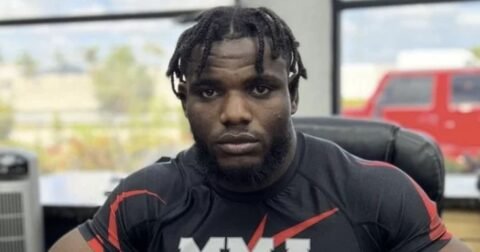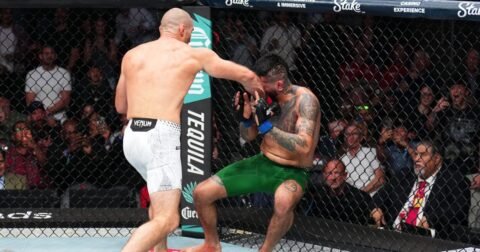In a remarkable journey from battling mental health challenges to reigning as the KSW heavyweight champion, Phil De Fries is set to defend his title for the twelfth consecutive time against undefeated Arkadiusz Wrzosek at KSW 107 this Saturday in Poland. This comeback story underscores not only De Fries’s athletic prowess, having transformed from a struggling UFC fighter to a dominant champion, but also highlights the importance of mental well-being, as he credits therapy and medication for turning his life around. Prepare to witness a fight that resonates beyond the cage, illustrating how resilience and support can lead to incredible transformations.
Phil De Fries: From UFC Challenges to KSW Success
Phil De Fries’s journey in mixed martial arts has been nothing short of remarkable. After announcing his arrival in the UFC with a win against Rob Broughton in 2011, his career quickly spiraled downwards due to a series of detrimental experiences inside the octagon. With a record that fell well short of expectations, De Fries faced devastating knockouts against future titleholders like Stipe Miocic and Matt Mitrione, leading to his early exit from the UFC. These challenges set the stage for a tumultuous period where De Fries struggled both professionally and personally, ultimately becoming a reflection of his mental health issues.
The transition to KSW opened a new chapter for De Fries, allowing him to regroup and reclaim his passion for fighting. After clinching the KSW heavyweight championship in 2018, he has since established remarkable dominance in the organization, achieving a streak of victories over notable opponents and demonstrating a newfound resilience. This resurgence is not just a testament to his physical skills but also highlights the importance of mental health in achieving success in an intensely competitive sport.
Confronting Battle with Anxiety and Depression
Throughout his career, De Fries faced debilitating anxiety and depression that overshadowed his once-promising path in MMA. After descending into self-destructive habits that included heavy drinking and substance abuse, he realized it was time for a change. De Fries’s candid admission of battling his mental health issues reflects a broader narrative within athletics, where many athletes struggle silently, often feeling they have no outlet or support. His confession about contemplating suicide adds an urgent dimension to this narrative, illustrating how mental wellbeing can be a silent killer for many in the sport.
Key to De Fries’s recovery was seeking help through therapy and medication, which profoundly changed his outlook on life and competition. He shares that recognizing his anxiety disorder was a turning point, allowing him to confront the issues that had plagued him for years. “After getting kicked out of the UFC, things spiraled out of control,” he explained, emphasizing how awareness and treatment provided him with the necessary tools to manage his condition and return to the cage rejuvenated.
The Role of Therapy in De Fries’s Comeback
Therapy and medication have played an indispensable role in Phil De Fries’s impressive comeback. Since starting his treatment, he has not only improved his mental health but also transformed his performance in the cage, amassing an impressive record with KSW. De Fries’s acknowledgment of therapy as a foundational element for his current success reinforces the growing awareness of mental health in sports. Athletes are increasingly encouraged to seek mental health support as a legitimate pathway to ensure overall well-being and better performance.
De Fries’s success serves as a powerful reminder that mental health struggles do not define an athlete’s capabilities. “I actually enjoy my life now; sparring is enjoyable, and I’m smiling when I walk into the cage,” he remarked. His story is indicative of how addressing mental health issues can lead to significant personal and professional growth, setting an example for young athletes facing similar challenges.
Preparing for KSW 107 and Facing Arkadiusz Wrzosek
As De Fries approaches his twelfth KSW title defense against the undefeated Arkadiusz Wrzosek at KSW 107, he emphasizes the importance of strategy in his fighting style. Acknowledging Wrzosek’s kickboxing pedigree, De Fries intends to utilize his grappling skills to gain an advantage inside the cage. He expresses confidence in his ability to test Wrzosek’s grappling, hinting at an astute understanding of MMA dynamics that intertwine striking and takedown threat.
“I may not be a better striker, but I can fight MMA better than he can,” De Fries quipped, indicating his tactical approach to the bout. His insight reflects a growing understanding of how grappling can set up opportunities in mixed martial arts, showcasing his evolution as a fighter who respects both his opponent’s strengths and his own conditioning derived from comprehensive training. With a renewed sense of purpose and mental clarity, De Fries remains focused and ready to defend his title as he gears up for his highly anticipated showdown.
Looking Ahead: Goals and Retirement Plans
Phil De Fries has clear goals as he looks to the future of his MMA career. With aspirations to continue competing for several more years, he is also mindful of his mental health journey and how it influences his long-term plans. Although he envisions retiring after a series of successful title defenses, he remains cautious about the possibility of transitioning off medication, hinting at the ongoing nature of his mental health journey.
Despite his concerns, De Fries approaches retirement with a sense of hope and a positive outlook on what life can offer beyond the cage. “After fighting, when I don’t have to compete anymore, my life will be less stressful,” he reflects. This statement encapsulates not only his dedication to the sport but also his understanding of the balance required to maintain his mental well-being. As he prepares to face Wrzosek, De Fries embodies the resilience necessary to thrive in a sport that has tested him time and again.
Inspiring a New Generation of Fighters
Phil De Fries’s journey serves as a beacon of hope for many aspiring fighters hailing from backgrounds troubled by mental health issues. His resilience demonstrates that setbacks can transform into comebacks, inspiring others to pursue their dreams even against the odds. In an industry that oftentimes stigmatizes mental health, De Fries stands firm in his beliefs, advocating for openness and support among fighters and athletes everywhere.
As De Fries readies himself for KSW 107, his message resonates not only with fans but also with fellow fighters struggling with similar challenges. The victories he has achieved are not merely confined to physical encounters in the octagon; they extend into a broader, more meaningful arena — the fight for mental health awareness. His story embodies a conversation that urgently needs to take place within all levels of sports, especially in combat sports, where mental toughness is often prioritized over emotional well-being.
| Key Point | Details |
|---|---|
| Current Titleholder | Phil De Fries is the KSW heavyweight champion, with plans for his 12th title defense. |
| Upcoming Fight | Scheduled to fight Arkadiusz Wrzosek at KSW 107 in Poland. |
| Mental Health Journey | De Fries overcame anxiety and depression through therapy and medication. |
| UFC History | Struggled during his time in the UFC, which affected his performance and mental health. |
| Support System | Credits medical support for his recovery and current success. |
| Fight Tactics | Plans to test Wrzosek’s grappling skills and possibly aim for a submission victory. |
| Career Outlook | Aims to compete for four more years and eventually come off medication. |
| Impact of Success | De Fries experiences increased happiness and financial stability with his current championship status. |
Phil De Fries’s journey from struggling in the UFC to dominating at KSW highlights the critical role mental health plays in sports success. His transformation through therapy and medication serves as a powerful reminder of the importance of addressing mental health challenges, encouraging others to seek help and find their own paths to resilience.
Frequently Asked Questions
What mental health issues did Phil De Fries face during his MMA career?
Phil De Fries struggled with anxiety and depression, which he initially didn’t recognize. He experienced severe anxiety that affected his daily life and contributed to challenges in his fighting career, leading him to seek therapy and medication for recovery.
How did therapy and medication impact Phil De Fries’s performance in the KSW?
Therapy and medication greatly improved Phil De Fries’s mental health, enabling him to find joy in fighting and significantly increasing his performance, resulting in him becoming the KSW heavyweight champion with a streak of 12 consecutive title defenses.
What was De Fries’s approach to competing against undefeated fighters like Arkadiusz Wrzosek?
De Fries acknowledges that while he may not be a better striker than Wrzosek, he believes he can outmaneuver him in MMA by utilizing takedown feints to create striking opportunities, reflecting his confidence in his grappling skills.
What changes did Phil De Fries make in his life after recognizing his anxiety issues?
After recognizing and managing his anxiety through therapy, Phil De Fries shifted his perspective on fighting, began enjoying his profession, and decided to pursue a positive and successful path in MMA, leading him toward championship success.
What future plans does Phil De Fries have regarding his career and medication?
Phil De Fries plans to continue his MMA career for about four more years before considering retirement and potentially coming off his medication. He acknowledges the positive impact of medication on his life but expresses a desire to eventually overcome his reliance on it.







